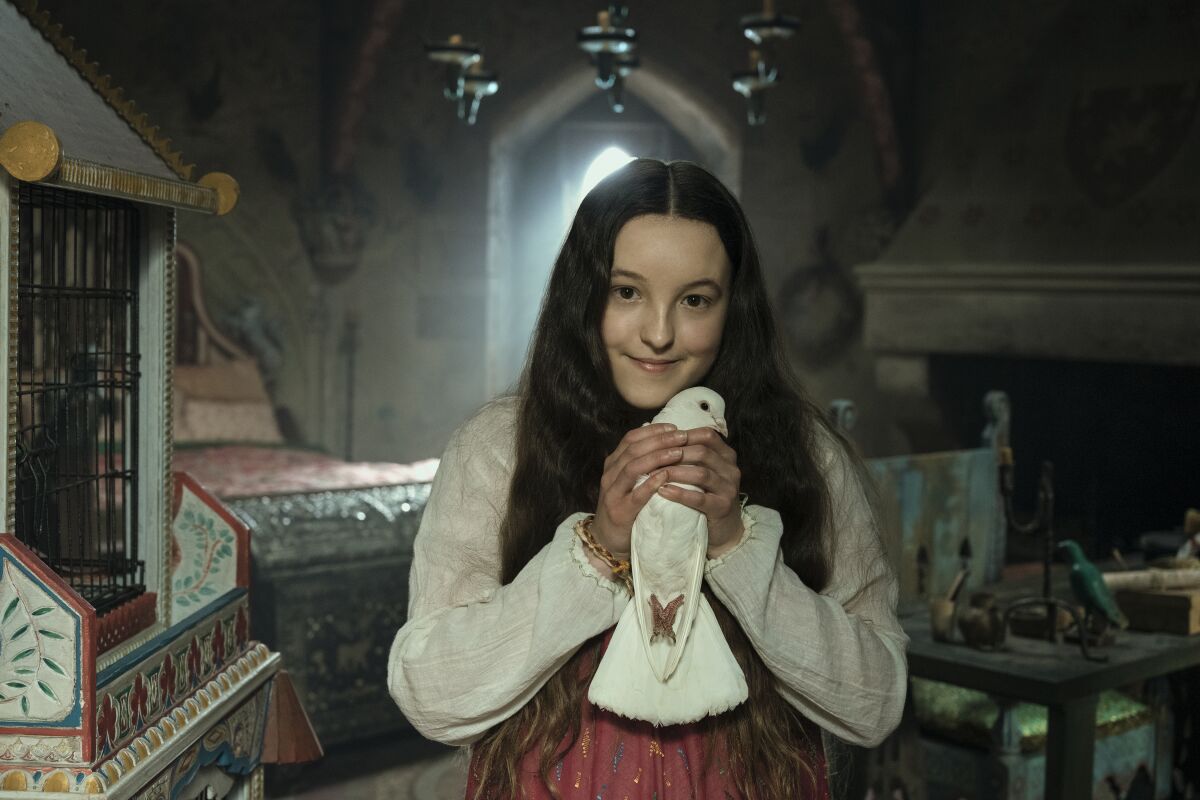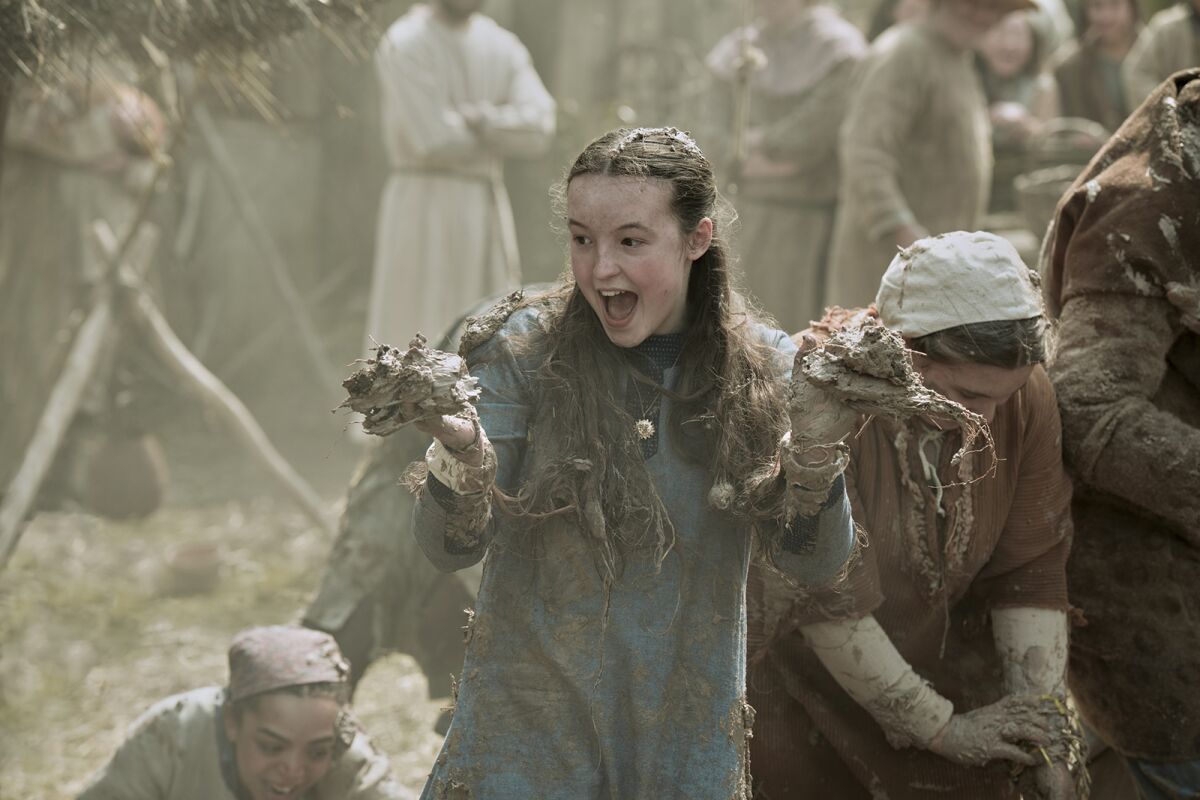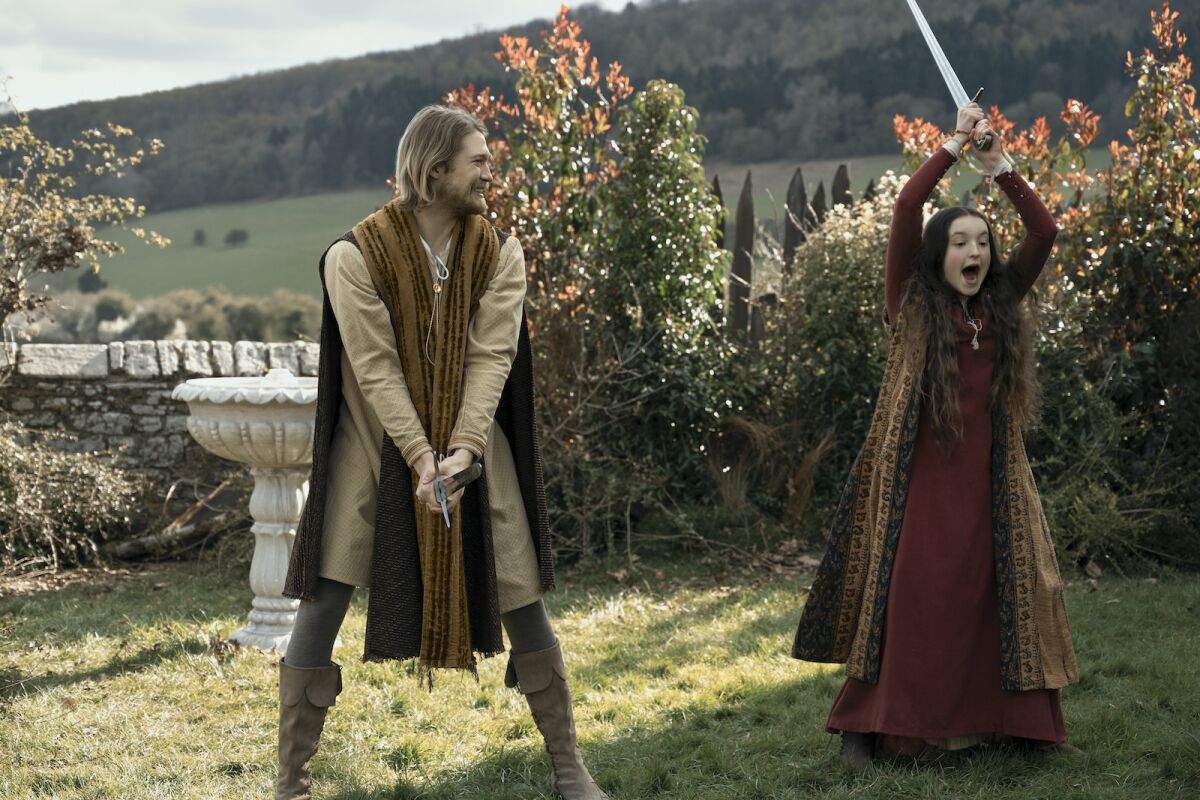Why ‘Catherine Called Birdy’ changes the book’s ending
Throughout history, there has been one universal truth: A teenager is a teenager, no matter the era. That’s the sensibility of “Catherine Called Birdy,” a new film adapted from Karen Cushman’s 1994 young adult novel of the same name. The book, about a rebellious teen girl living in the English feudal system of 1290, has been beloved by readers for nearly three decades. One of those readers, who discovered the novel when she was 10, is the picture’s writer-director, Lena Dunham.
“It was the first time I’d read a character maybe since Eloise who I felt really reflected both who I was and who I wanted to be,” Dunham says, speaking in London ahead of the movie’s release. “And so the book was always with me. I would read it a couple times a year. It was like my comfort book, my cozy book. When I was in college, I started reading a lot about women who rebelled against medieval culture like Christine de Pizan — I got really into her poetry — and started thinking about that time period. Then when someone asked me, around ‘Girls,’ ‘Is there a piece of — to use a very Hollywood word — IP [intellectual property] you would want to adapt?’ I was like, ‘Oh, yeah, I think I know what it is.’”
Dunham walked us through the process of bringing the book to the screen, from casting its unique heroine to putting her own spin on the ending.
First things first

Bella Ramsey in “Catherine Called Birdy.”
(Alex Bailey/Prime Video)
Dunham initially secured the rights to Cushman’s novel 10 years ago. At the time, movies based on young adult books were fantastical or dystopian, like “The Hunger Games” or “Twilight.” Dunham wasn’t sure if there was space for something more grounded in reality with a teenage protagonist who didn’t have any special powers.
“It was of another time, literally and figuratively,” Dunham remembers. “And so it took a little while to find the partner, which turned out to be Working Title, who understand what it was meant to be.”
Dunham finally wrote the screenplay in fall 2019. She had Cushman’s blessing to make the story her own, and Dunham did make several key alterations. Because the novel is written as a diary by Birdy for her brother, Edward, a monk, Dunham used voice-over to retain the sense of the character speaking directly to the viewer. She added new scenes and removed others (devoted readers will note that, notably, Birdy does not rescue a bear in Dunham’s adaptation).
“In some ways, with the changes, I thought of it as just elaborating on Karen’s story,” Dunham says. “Not necessarily changing it, but just expanding it, because she’s a character who’s so easy to imagine more and more and more from that. When there’s a scene or a character who doesn’t exist in the book, it’s not that I’m taking Karen’s work and tweaking it. It’s more just building out the world. And so I like to think if you enjoyed the movie, the book can be a companion piece and vice versa.”
Casting ‘Birdy’

Bella Ramsey in “Catherine Called Birdy.”
(Alex Bailey/Prime Video)
The intention was to shoot in spring 2020 — that plan was obviously delayed — and Joe Alwyn, who plays Birdy’s beloved Uncle George, was the first actor cast (Dunham wrote the role specifically for him). The success of the adaptation, however, hinged on finding the right actor to play Birdy, a spunky teen who is not only messy, chaotic and emotional but but also empathetic and intelligent. Dunham met with only one person: Bella Ramsey, best known for playing Lyanna Mormont on “Game of Thrones.”
“Nina Gold, our casting director, said: ‘I think I know who this is,’ and pulled out a picture of Bella,” Dunham recalls. “I was like, ‘Yeah, that’s who it is.’ Before Bella came in and read, there had always been a blurry spot where Birdy’s face was and now I could see the face. And I knew that the film lived and died by Birdy because she is in every frame, [because] even when we’re not looking at her, we’re looking out through her eyes. It just required someone who had Bella’s deep empathy and humanity. And Bella is also really f— funny.”
The casting is particularly effective because Ramsey, now 18, was an actual teenager while filming the movie in early 2021.
“It was really important, because it’s just about being a messy teenager, like Lena said, without any special skills or passions, apart from avoiding her chores, or big romance apart from crushing Uncle George,” Ramsey notes. “It’s more just existing as a teenager. I think I learned as well that the times can change, the world can shift around you, but the experience of being a teenager is the same in any time period. Just with different challenges, depending on the different times.”
Characters reconceived

Joe Alwyn and Bella Ramsey in “Catherine Called Birdy.”
(Alex Bailey/Prime Video)
In the novel, Birdy’s father, Lord Rollo, is a brute of a man, often described as bullish and disgusting. In the film, he’s played by Andrew Scott, who offers a more sensitive side of the character. He’s a devoted husband to his wife, Lady Aislinn (Billie Piper), and traipses around their manor in fine clothes. Dunham compares him to that dad who wears a lot of Gucci and a gold chain.
“He’s the one that changed the most from the book,” she says. “He’s a very brutish, almost like a primitive man in the book. And something that Andrew and I talked about early on was the idea that we didn’t want any of the male characters to feel like these stereotypes of anti-feminist male-hood. Andrew really brought up this idea [that] every single person in this world is trapped by convention in their own way.”
“One of the initial conversations, [which] actually continued a lot, was about how we could really personalize the relationship between Birdy and the father even more,” Scott adds. “And how the people who clashed the most sometimes in families are the ones who are the most similar. I was interested in the idea of how he might be suffering under this macho society as well. And what would it be like if he was a little less mature than he appears in the book? That he was somebody who likes the finer things in life, to wear silk pajamas and jewelry. To make him somebody who’s not a good sword fighter.”
George, the object of Birdy’s affection in the novel and film, didn’t shift as drastically, but Alwyn wanted to ensure that the character’s relationship with Birdy felt clear. Initially, there wasn’t a moment in the script where George had a frank conversation with his niece, telling her that he couldn’t rescue her from her fate of being married off for money. But after some discussion with Alwyn, Dunham added that scene toward the end.
“I interpreted him as that very recognizable figure in a young person’s life, however old you are, when you have someone, be it a neighbor or a friend or a family member or a teacher or whoever it might be, that is completely the knight in shining armor in your life,” Alwyn says. “That feeling was so relatable. As was the moment where that façade falls down. You either realize, or you are told, or a bit of both, that they’re actually just pretty normal. And as messy and sometimes as unhappy as the next person. I really liked the idea of that relationship.”
Finding the right ending
The film’s ending has similar shades of emotion to that of the novel, but it is perhaps the biggest change Dunham made. In the book, Birdy’s intended suitor — a grotesque but wealthy man she calls Shaggy Beard — dies, and she reconciles herself to a match with his son. The movie is more open to interpretation, leaving Birdy in a place of self-acceptance.
“I like how ambiguous it is,” Ramsey says. “It allows freedom. [It’s about] the idea that she has the knowledge and the tools now to deal with this [reality]… It’s her realizing that she can be free within the confines of her time.”
“I used to think that real art meant that you went for the hard, tough ending,” Dunham adds. “And often, I would lean into things that I thought were uncomfortable or dark. I remember Judd Apatow being like, ‘It’s OK sometimes to have people be sweet to each other.’ [But] there was something about making something that was more intended for a YA and leaning into joy that made me realize it’s really nice to do that. Movies are meant to take us somewhere else.”
Cushman’s novel is resoundingly feminist, especially for when it was published (1994). It raises questions about the roles women are forced into and why they’re forced into them. Dunham’s version amps up those questions with a more contemporary feel. She retains the 1290 setting and the period detail but uses modern music, current ideas and inclusive casting that reflect today’s audience. The underlying social ideas, while there, are secondary to the picture’s carefree, warm-hearted spirit.
“A historical film isn’t as accessible, unless you’re really wanting to sit down and learn about things, which is totally an option and something we enjoy as well,” Ramsey says. “But I think it’s just nice to have something so joyful. Rather than it being something serious in the Middle Ages and being incredibly depressing, it’s joyful and it’s accessible, but also feels like the time [period] with a fresh take on it.”
“Lena has an almost unique ability to be able to send a message out through comedy,” Scott adds. “It’s an incredibly difficult thing to do that people really underestimate, and I know very few people who are able to do that. You’re involved in the characters and you think, ‘Oh, that person is messy and wild and chaotic, and, in some ways, it gives me permission to be that myself.’”
For all the latest Entertainment News Click Here
For the latest news and updates, follow us on Google News.
